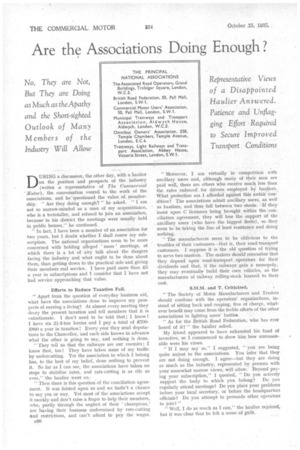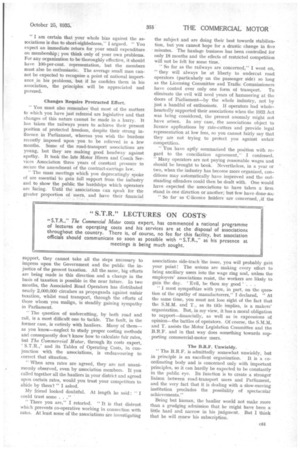Are the Associations Doing Enough?
Page 102

Page 103

If you've noticed an error in this article please click here to report it so we can fix it.
DURING a discussion, the other day, with a haulier on the position and prospects of the industry (writes a representative of The Commercial Motor), the conversation veered to the work of the associations, and he' questioned the Value of membership. "Are they doing enough'" he asked. " I am not so narrow-minded as a man of my acquaintance, who is a teetotaller, and refused to join an association, becausein his district the meetings were usually held in public houses," he continued.
" In fact, I have been a member of an association for two years, but I doubt whether I shall renew my subscription. The national organizations seem to be more concerned with holding alleged ' mass ' meetings, at which there is a lot of airy talk about the dangers facing the industry and what ought to be done about Them, than getting down to the practical side and giving their members real service. I have paid more than £5 a year in subscriptions and I consider that I have not had service approaching that value.
Efforts to Reduce Taxation Fail.
"Apart from the question of everyday business aid, what have the associations done to improve my prospects of earning a living? At almost every meeting they decry the present taxation and tell members that it is extortionate. I don't need to be told that ; I know ! I have six 2i-3-ton lorries and I pay a total of £700£0Q a year in taxation ! Every year they send deputations to the Chancellor, and each side knows in advance what the other is going to say, and nothing is done.
"They tell us that the railways are our enemies ; I know that, too ! They have taken some of my traffic by undercutting. Yet the association to which I belong has, to the best of my belief, done nothing to prevent it. So far as I can see, the associations have taken no steps to stabilize rates, and rate-cutting is as rife as ever," the haulier went on.. .
" Then there is this question of the conciliation agreement. It was foisted upon us and we hadn't a chance to say yea or nay. Yet most of the associations accept it meekly and don't raise a finger to help their members, who, partly through the neglect of their 'champions,' are having their business undermined by rate-cutting and restrictions, and can't afford to pay the wages.
c00
" Moreover, I am virtually in competition with ancillary users and, although many of their men are paid well, there are others who receive much less than the rates enforced., for drivers employed by hauliers., What protection am I afforded against this unfair' Condition? The associations admit ancillary users, as well as hauliers, and thus fall between two stools. If they insist upon C licensees being brought within the conciliation agreement, they will lose the support of the. , ancillary users (who have the biggest fleets), so they seem to be taking the line of least resistance and doing nothing.
" The manufacturers seem to be oblivious to the troubles of their customers—that is, their road-transport customers. I suppose it is the old question of trying to serve two Masters. The makers should remember that they depend upon road-transport operators for their dividends and that, if the railways gain a monopoly, they may eventually build their own vehicles, as the manufacturers of railway rolling-stock learned to their cost.
S.M.M. and T. Criticized.
" The Society of Motor Manufacturers and Traders should combine with the operators' organizations, instead of sitting back and reaping, free of charge, whatever benefit may come from the feeble efforts of the other associations in fighting users' battle..
"As for the British Road Federation, who has ever heard of it? " the haulier asked.
My friend appeared to have exhausted his fund of invective, so I commenced to show him how unreasonable were his views.
"If I may say so," I suggested, "you are being quite unjust to the associations. You infer that they are not doing enough. I agree—but they are doing as much as the industry, represented by persons with your somewhat narrow views, will allow. Beyond paying your subscription," I queried, "Do you actively support the body to which you belong? Do you regularly attend meetings? Do you place your problems before your local secretary, or before the headquarters officials? Do you attempt to persuade other operators to join? "
" Well, I do as much as I can," the haulier rejoined, but it was clear that he felt a 'sense of guilt. " I am certain that your whole bias against the associations is due to short-sightedness," I argued. " You expect an immediate return for your small expenditure on membership ; you think only of your own problems. For any organization to be thoroughly effective, it should have 100-per-cent. representation, but the members must also be enthusiastic. The average small man cannot be expected to recognize a point of national importance in his problems, but if he confides them in his association, the principles will be appreciated and pursued.
Changes Require Protracted Effort.
" You must also remember that most of the matters to which you have just referred are legislative and that changes of this nature cannot be made in a hurry. It has taken the railways years to achieve their present position of protected freedom, despite their strong influence in Parliament, whereas you wish the burdens recently imposed upon • you to be relieved in a few months. Some of the road-transport associations are young, but they are making good headway against apathy. It took the late Motor Hirers and Coach Services Association three years of constant pressure to secure the amendment of the contract-carriage law.
" The mass meetings which you deprecatingly spoke of are essential to gain full support from the industry and to show the public the hardships which operators are facing. Until the associations can speak fOr the greater proportion of users,. and have their financial support, they cannot take all the steps necessary to impress upon the Government and the public the injustice of the present taxation. All the same, big efforts are being made in this direction and a change in the basis of taxation is possible in the near future. In two months, the Associated Road Operators has distributed nearly 2,000,000 circulars as propaganda against unfair taxation, whilst road transport, through the efforts of those whom you malign, is steadily gaining sympathy in Parliament.
" The question of undercutting, by both road and rail, is a most difficult one to tackle. The fault, in the former case, is entirely with hauliers. Many of them— as you know—neglect to study proper costing methods and consequently don't know how to calculate fair rates, but The Commercial Motor, through its costs expert, and its Tables of Operating Costs, in conjunction with the associations, is endeavouring to correct that situation.
"When area rates are agreed, they are not unanimously observed, even by association members. If you called together all the hauliers in your district and agreed upon certain rates, would you trust your competitors to abide by them? " I asked.
My friend looked doubtful. At length he said: "I could trust some . . ."
" There you are," I retorted. "It is that distrust which prevents co-operative working in connection with rates. At least some of the associations are investigating the subject and are doing their best towards stabilization, but you cannot hope for a drastic change in five minutes. The haulage business has been controlled for only 18 months and the effects of restricted competition will not be felt for some time..
"So far as the railways are concerned," I went on, 'they will always be at liberty to undercut road operators (particularly on the passenger side) so long as the Licensing Committee and Traffic Commissioners have control over only one form of transport. To eliminate the evil will need years of hammering at the doors of Parliament—by the whole industry, not by just a handful of enthusiasts. If operators had wholeheartedly supported their associations when the 1933 Act was being considered, the present anomaly might not have arisen. In any case, the associations object to licence applications by rate-cutters and provide legal representation at low fees, so you cannot fairly say that they are not trying to protect you against unfair competition.
" You have aptly summarized the position with regard to the conciliation agreement," I confessed. "Many operators are not paying reasonable wages and should be brought to book. Nevertheless, in a year or two, when the industry has become more organized, conditions may automatically have improved and the outstanding offenders could then be dealt with. One would have expected the associations• to have taken a firm stand in One direction or another, but few havedon& gov
"So far as 'C-licence holders are concerned if the associations side-track the issue, you will probably gain your point ! The unions are making every effort to bring ancillary users into the wage ring and, unless the employers' associations resist, the workers are likely to gain the day. 'Evil, be thou my good ' . . .
" I must sympathize with you, in part, on the question of the apathy of manufacturers," I declared. "At the same time, you must not lose sight of the fact that the S.M.M. and T., as its title implies, is a makers' organization. But, in my view, it has a moral obligation to support—financially, as well as in expressions of opinion—the battles of operators. Of course; the S.M.M. and T. assists the Motor Legislation Committee and the B.R.F. and in that way does something towards supporting commercial-motor users.
The B.R.P. Unwieldy.
"The B.R.F. is admittedly somewhat unwieldy, but in principle is an excellent organization. It is a coordinating body and is concerned only with important principles, so it can hardly be expected to be constantly in the public eye. Its function is to create a stronger liaison between road-transport users and Parliament, and the very fact that it is dealing with a slow-moving institution precludes the possibility of spectacular achievements."
Being but human, the haulier would not make more than a grudging admission that he might have been a' little hard and narrow in his judgment. But I think that he will renew his subscription.
















































































































































